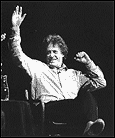When Theater and Math Converge
By Julia Sommer, Public Affairs
Posted February 24, 1999
 Tom Stoppard. Peg Skorpinski photo. |
The topic was Stoppard's use of math in his 1993 play "Arcadia," which tackles such concepts as Fermat's Last Theorem, chaos theory and iterated algorithms.
Sharing the Hertz Hall stage with Stoppard and Osserman were four talented actors from the campus's Center for Theater Arts, who performed math-oriented scenes from the play.
Stoppard, whose formal education ended at 17, professed no special knowledge of math, but held his own with Osserman, who seemed to know "Arcadia" by heart.
The appreciative audience clearly held its share of both theater-lovers and mathematicians.
Osserman noted that just two months after "Arcadia" opened, a Princeton mathematician came up with a proof of Fermat's Last Theorem -- a feat that had tantalized mathematicians since 1820. Stoppard added that the Time magazine story on the proof was then inserted into the play's program.
Stoppard admitted to a fascination for math, saying that "chaos theory must be a potent metaphor for something."
A lively discussion of whether nature is a manifestation of numbers ensued, with Stoppard noting the "spooky" way that chaos theory equations can describe behavior in the natural world.
He pointed out that, unlike math, "art by definition is inexhaustible" and has no need of "a theory of everything." Osserman disagreed, and Stoppard noted that "discussions get interesting when there's a failure of vocabulary."
Stoppard also offered a good layperson's description of entropy: "something any mother with a teenage daughter understands -- you can move things around in a room, but it never gets tidier."
Stoppard was in town for the U.S. premiere of his play "Indian Ink," by ACT in San Francisco, which opened Feb. 18.
![]()
![]()
February 24 - March 2, 1999 (Volume 27, Number 24)
Copyright 1999, The Regents of the University of California.
Produced and maintained by the Office of Public Affairs at UC Berkeley.
Comments? E-mail berkeleyan@pa.urel.berkeley.edu.